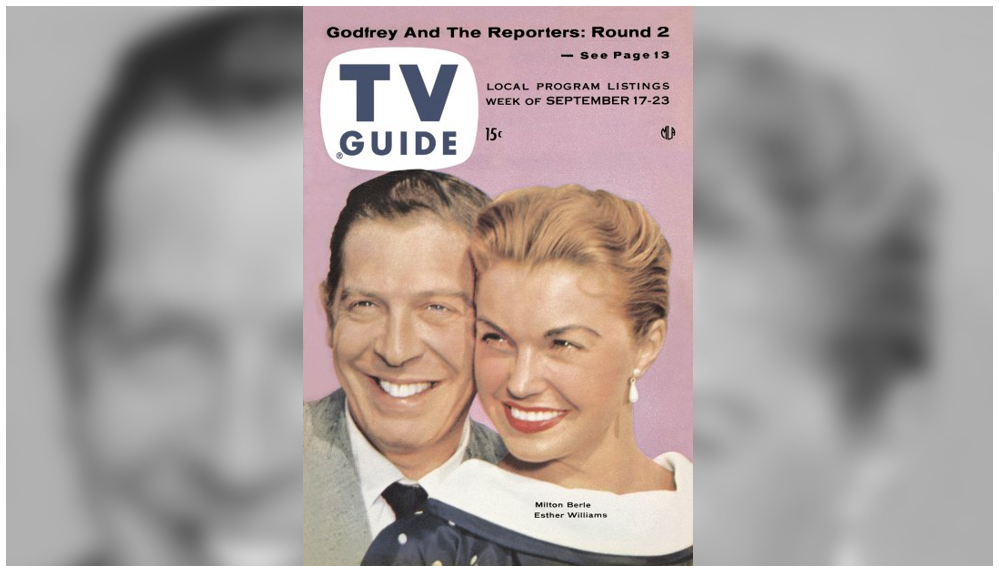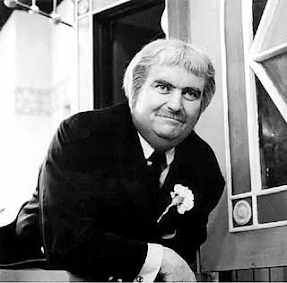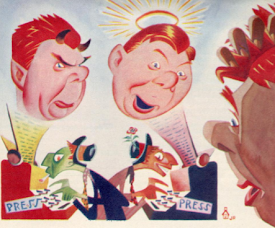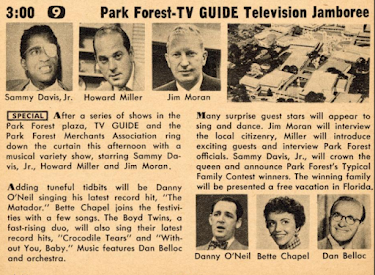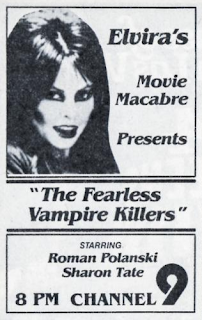We start off the week with Bob Johnson's very amusing article on James Garner and Jack Kelley, the "Maverick Brothers" of ABC's Sunday night series.
The two stars maintain separate lives; Johnson suggests that "the boys don't like to discuss each other," although I'm not sure that there's any particular animosity between them. Certainly Garner, who was the first Maverick, is also first among equals; his episodes have higher ratings, and his appearances outnumber Kelly's through the course of the season (of the 20 episodes so far this season, nine have starred Garner, six for Kelly, and five have featured both of them.
It's not hard to dissect Garner's popularity; his easy-going manner, the implicit humor he brings to the role, are all products of his acting talent - or, as he puts it, his lack of same. He's no actor, he insists, but a personality; in fact, he
can't act. "I'll learn if I have to, but I haven't had to yet. I'm playing
me. Bret Maveri k is lazy. I'm lazy. I like to get the bit over with at the studio and get out of there. I like being lazy." He adds that he's never taken a script home to study, "and I don't plan to."
You might be familiar with the story behind
Maverick, of how the first few episodes were played straight - stock Westerns - until bored scriptwriter Marion Hargroves inserted a stage direction that changed the series forever. "Maverick," he wrote, "looks at him with his beady little eyes." Garner loved it. "You can't say that about a star," Garner says the research department told Hargroves. Nonsense, replied Hargroves; he'd met Garner, and he
does have beady little eyes.
Soon the series had made the transformation to a comedy, and the Maverick boys "have been subjected to more house gags, in stage directions by Hargrove and other writers, than any two other actors living." For example, when Kelly leaves the saloon, he doesn't just leave. "He sees his horse. He smiles. His horse sees him and just nods." Garner is described as "ahr hero" or "an itinerant clergyman," and when he considers a problem, "we can see his flabby little mind make a small connection." There's even a situation where "His face shows resentment, frustration, anxiety an danything else the director thinks he can get out of him." These directions don't explicitly show up on screen, of course, but it influences the way Garner and Kelly play their roles, and more important it indicates the spirit that has infected the entire show.
Interestingly, Kelly thinks the show can go three more seasons after this one, but "Garner has other ideas." As to what those ideas are, Johnson doesn't really say; instead, he captures Garner talking about the recent satire the show did on
Gunsmoke. ("It's a classic.") Garner's other ideas, however, don't include three more seasons of
Maverick; he quits the series in 1960 in a dispute with Warner Brothers, a case he wins in court. He's replaced by, at various times, Roger Moore and Robert Colbert; ultimately, in the fifth and final season (as Jack Kelly predicted), reruns of old Garner stories alternate with Kelly's new shows.
Maverick ends its run with a secure place in TV history, and a warm spot in viewers' hearts.
◊ ◊ ◊
Before we get to this week's programs, I'd like to take a minute to mention the article on Bob Keeshen, aka Captain Kangaroo, talking about the philosophy behind his series. "One important lesson I try to teach my own kids is that gentleness in a person doesn't necessarily indicate weakness; and that good manners and thoughtfullness are necessary to a happy life."
He's an ambassador for UNICEF, and creator of the "Trick or Treat" campaign that encouraged kids to collect coins, rather than Halloween candy, for the UN organization. Its success had led him to travel to other countries, including a stop at the Brussels World's Fair, encouraging similar ideas. He has a long-term goal of creating a news show for children, explaining the issues of the day in a way that they can understand. (A forerunner of
In the News, perhaps?) Says the good Captain, "Children are ain important part of the world - today's world. We owe them an honest explanation of what's happening to it."
It's also worth a moment to mention this week's starlet, Nancy Malone, the 23-year old who started out on Broadway ("Time Out for Ginger"), has guested in numerous television drama anthologies, and is currently appearing in the CBS sudser
The Brighter Day, along with her dog, Miss Madrigal. Next year she'll take on her best-known role, that of Detective Adam Flint's girlfriend Libby, in
Naked City, and later she'll appear in
The Long Hot Summer.
After that she'll work her way up the entertainment ladder, moving into producing and directing (where she wins an Emmy and is nominated for two others), and does a stint as vice-president of television at 20th Century Fox. An example of a starlet who makes good.
◊ ◊ ◊
 One of Ed Sullivan's first great on-air challenges came from Steve Allen, who left
One of Ed Sullivan's first great on-air challenges came from Steve Allen, who left Tonight
to take over an NBC variety show which, at the beginning, aired opposite Ed. It didn't run as long as Ed's, of course, but then Allen said his goal was never to conquer Ed, but to coexist with him, which he did for three seasons. Let's see who gets the best of the contest this week.
Sullivan: Ed's guests are actress Celeste Holm; French singer Edith Piaf; musical-comedy star Pat Suzuki; operatic soprano Antonietta Stella; musical-comedy writers Betty Comden and Adolph Green, currently appearing on Broadway in a two-man show; comedian Alan Drake; and juggler Francis Brunn.
Allen: Steve's guests are actress Esther Williams and singers Vic Damone and Jennie Smith. A large part of tonight's show takes place in and around a swimming pool located in the studio. Steve dons a bathing suit to join Miss Williams in an aquatic comedy routine.
As far as stars go, it's hard to top Celeste Holm, Edith Piaf, and Comden and Green. As far as entertainment, Steve Allen in a bathing suit with Esther Williams, cavorting in a studio swimming pool - that says it all. It depends on what turns you on, which is why this week is a
push.
◊ ◊ ◊
On a very quiet
Saturday, I'll give the nod to Perry Como's show (7:00 p.m., NBC). Perry's guest stars are Nat King Cole, the McGuire Sisters, and Dick Van Dyke. At 11:30 p.m., KDAL in Duluth has the movie
Michael Shayne, Private Detective, starring Lloyd Nolan. It's actually a pretty good movie if you forget both the novels by Brett Halliday and the series starring Richard Denning. Opposite that, on WTCN, is
I Led Three Lives, and this week "Herb Philbrick becomes embroiled in a Communist plot to infiltrate a labor union." What a shock.
Sunday is a day of substance;
Meet the Press expands to an hour on
Sunday afternoon (5:00 p.m., NBC) for an appearance by Soviet First Deputy Premier Anastas Mikoyan, next to Khruschev the most powerful man in the Soviet Union. Mikoyan was a survivor if nothing else, serving Lenin, Stalin, Khrushchev and Brezhnev, and was one of the rare top Soviet officals to retire rather than meet a violent death at the hands of a rival; although he was forced out by Brezhnev, he died of natural causes in 1978. In the great panoply of Communist figures, Mikoyan was thought to be friendlier to the United States than most. He's being interviewed here on the occasion of his second trip to America.
Following
Meet the Press, Nina Foch stars in a special presentation of Agatha Christie's famed mystery
Ten Little Indians. (6:00 p.m., NBC) In today's politically correct times, it would probably be known by its alternate title, "And Then There Were None." Fine with me; the original title of the story is
even more problematic.
At 8:00 p.m., it's
G.E. Theater on CBS, starring Tony Curtis. In 1960, after doing "The Young Juggler" for
Startime,
Curtis will swear off television for the world of movies. That's a year away, though, and so we can apreciate him this Sunday on
G.E. Theater's story of David and Goliath, "The Stone." (8:00 p.m., CBS)*
*
It probably only amuses me that when Tony Curtis appeared on The Flintstones,
his character was named "Stoney" Curtis.
Is this the funniest hour on television? Is it even the funniest hour on
Monday? I wouldn't know about that, not being a particular fan of Danny Thomas, but he does have Tennessee Ernie Ford, which counts for something. Meanwhile, Ann Sothern resurrects the old question facing women of the time: do you choose a career, or marriage? To find out, though, you'll have to pass up
Peter Gunn on NBC and
The Voice of Firestone on ABC. Meanwhile, Patti Page's guests on her 9:00 p.m. ABC show are singer Julius LaRosa and ventriloquist Shari Lewis. It's not known whether or not Lamb Chop is included.
If one night of Steve Allen is good, two nights must be better, right?
Tuesday is the second night, and
Love That Bob* is the show (8:30 p.m., NBC). Tonight, Bob tries to get rid of his girlfriend Betty (Joyce Jameson) by telling her that he can get her a job on Steve's show. Even more significant than a second night of Steve, though, is the first night of
Alcoa Presents (9:00 p.m., ABC), which you'll probably recognize by its subtitle:
One Step Beyond. The much-loved cult series will stick around for three seasons.
*
Fun fact: According to the always-reliable Wikipedia, Love That Bob
was the first series to debut as a midseason replacement. There's no citation to prove it, though.
Wednesday night presents a stark reminder of what 1959 is like. Edward R. Murrow narrates "The Lost Class of '59" (7:00 p.m., CBS), a report on six high schools in Norfolk, Virginia, that have closed rather that submit to a federal court order to integrate. Murrow interviews local and state officials, as well as four local students discussing the situation. On a less dramatic note,
The Lawrence Welk Show airs on ABC at 6:30 p.m. There's a note in the listings that viewers watching the show on WTCN, the ABC affiliate in Minneapolis-St. Paul, "can hear this program in stereophonic sound by also tuning to radio station WTCN*, operating on 1280 kilocycles." Watching TV with stereo sound must have been something in 1959!
*
Fun fact: WTCN-TV is now KARE, while WTCN-AM is now WWTC 1280, The Patriot. It's all-talk radio, in case you hadn't figured that out.
On
Thursday, Cesar Romero guest stars as "The Gay Caballero" (not to be confused with
Guy Caballero) on
Zorro (7:00 p.m., ABC). I'll bet he steals the show. At 8:30 p.m., CBS's
Playhouse 90 presents "The Velvet Alley," a Rod Serling play about a struggling writer who may have finally gotten his big break when he sells a script to -
Playhouse 90. Art Carney makes a rare dramatic appearance as the playwright who has to ask himself whether success is worth selling your soul.
Speaking of show-stealing, Phil Silvers is well-positioned to steal
Friday in an expanded one-hour version of his series (8:00 p.m., CBS) which is wonderfully, bizarrely meta. In it, Sydney Chaplin (actor and son of Charlie), playing himself, plans to use Bilko's life story for an Army musical. Bilko travels to Hollywood to meet the actor chosen to play him: Phil Silvers! Diana Dors, also playing herself, guests; later this year, she'll marry an actor who'll do pretty well in an Army sitcom himself - Richard Dawson.
◊ ◊ ◊
As for sports this week, the PGA tour heads to Pebble Beach for the Bing Crosby Pro-Am, the final round of which is carried on ABC. (Sunday, 4:30 p.m.) Then, as now, the stars are part of the attraction, and this year's batch is expected to include Bob Hope, Phil Harris, Desi Arnaz, James Garner, Bob Crosby, Fred MacMurray, Randolph Scott and Dennis O'Keefe. And then there's Der Bingle, of course.
If golf's not for you, you can tune in the NBA Game of the Week on NBC (1:30 p.m.), although it's not shown locally in Minneapolis-St. Paul. It's a key matchup between two of the best teams of the era, the defending champion St. Louis Hawks meet the team they vanquished in the finals last year, the Boston Celtics. As for why this game wasn't on TV in the Twin Cities? Could be that the local team, the Minneapolis Lakers, were playing at the same time and the game was blacked out. (They
were playing the Philadelphia Warriors in Minneapolis that day.) You'll here more from the Lakers in the playoffs, as they upset the Hawks in the Western finals before losing to the Celts for the championship.
There's also basketball on Saturday afternoon (3:30 p.m.), although it's on so many different stations I can't tell if it was a network broadcast or a syndicated hookup (I suspect the latter). It's the Big 10 Game of the Week, with the hometown Minnesota Gophers playing the Purdue Boilermakers. However, I vote for hockey, with the NHL Game of the Week on CBS (1:30 p.m.) featuring the New York Rangers and Chicago Black Hawks from Chicago Stadium.
◊ ◊ ◊
Some notes from the TV Teletype:
Bill Lundigan's new series
Moon Flight, which is billed as a "new semidocumentary series abou tman's exploration of space," has gone into production. It will emerge with a new name,
Men Into Space, when it airs this September on CBS. You can catch reruns of it on Comet if you're so inclined. And speaking of new series, Tennessee Ernie Ford recently guested on Danny Thomas' series. The producer liked the character Ernie played on the show, and thought it was a great idea for a new sitcom - not for Ernie, but for Andy Griffith. They're working on it now, and when it premieres as
The Andy Griffith Show in October 1960, it will find a place in television history.
Dwayne Hickman is leaving
The Bob Cummings Show at the end of this season for his own series,
The Many Loves of Dobie Gillis, good for four seasons on CBS starting this fall. The detective series
Peter Gunn, which debuted last September on NBC, has been picked up for the rest of the year - a ful 39 episodes. And Dave Garroway has postponed his trip to Paris from April until early May - there's a funny ancedote about that trip in
my interview with Jodie Peeler.
Finally, a note from the local section that Miss America 1959, Carol Ann Mobley, "is in town to crown the North St. Paul Jaycee Queen," and will be appearing with Arle Haeberle on her WCCO afternoon show
Around the Town. I don't see any "Carol Ann Mobley" as Miss America, in 1959 or any other year. There is, however, a
Mary Ann Mobley, who happens to be Miss America 1959. I hope the Jaycees that were expecting Carol weren't too disappointed.
TV














